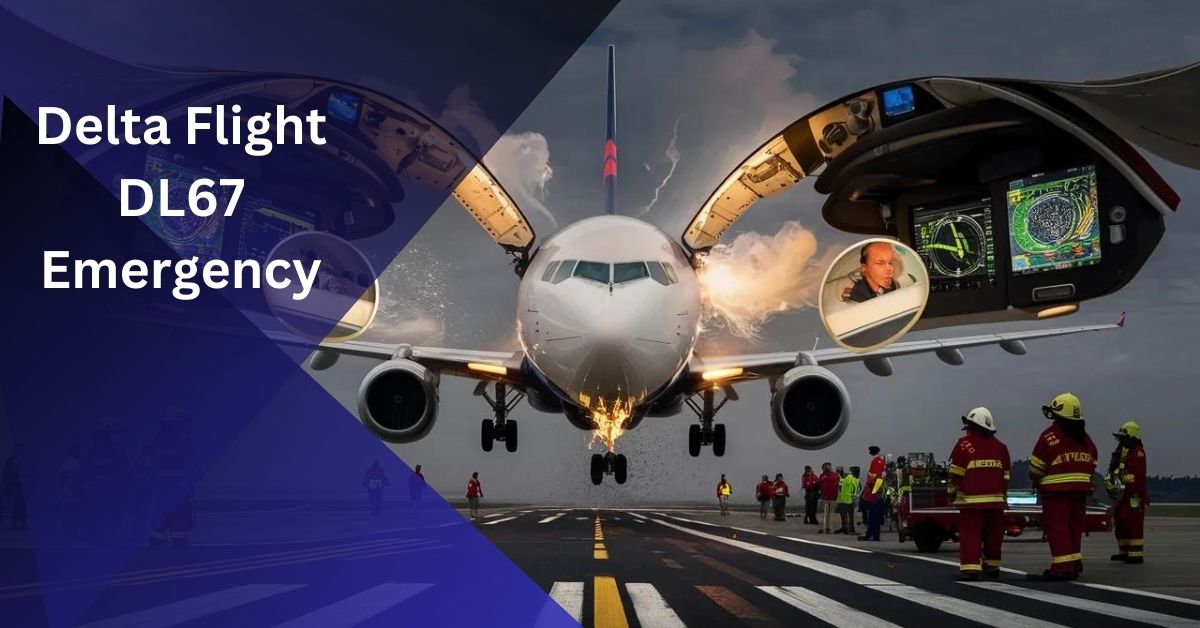Delta Airlines, one of the most reputable airlines in the world, faced a critical situation on April 11, 2024, when Delta Flight DL67 declared an emergency mid-air. The flight, originally scheduled to fly from Rome, Italy, to Atlanta, Georgia, encountered unforeseen circumstances that required immediate action.
This article delves into the details of the Delta Flight DL67 emergency, providing an in-depth analysis of the incident and its aftermath.
Background of Delta Flight DL67:
Delta Flight DL67 is a transatlantic flight operated by Delta Airlines, connecting the capital city of Italy, Rome, to Atlanta, one of the major cities in the United States.
This route is a vital link for travelers and serves thousands of passengers every year. On April 11, however, what was expected to be a routine flight turned into a dramatic event due to an unforeseen emergency.
The Medical Emergency Onboard:
At approximately 33,000 feet over the West of France, Delta Flight DL67 encountered a medical emergency. The situation was critical enough for the flight crew to declare a general emergency.
The details of the medical emergency have not been fully disclosed, but the severity of the situation necessitated immediate action from the crew.
Decision to Divert to Charles de Gaulle Airport:
Given the seriousness of the medical emergency on Delta Flight DL67, the flight crew made the swift decision to divert the plane to the nearest suitable airport. Charles de Gaulle Airport in Paris, France, was chosen due to its proximity and the availability of medical facilities.

The flight, which was initially headed towards Atlanta, was rerouted to Paris to ensure the affected passenger received the necessary medical attention as quickly as possible.
The Role of the Flight Crew:
The professionalism and quick thinking of the Delta Flight DL67 crew played a crucial role in managing the emergency. Declaring a general emergency is a serious decision, and the crew’s ability to maintain composure under pressure ensured the safety of all passengers on board.
The decision to divert the flight to Charles de Gaulle Airport was made in accordance with Delta Airlines’ protocols for such emergencies, highlighting the airline’s commitment to passenger safety.
Landing at Charles de Gaulle Airport:
Delta Flight DL67 successfully landed at Charles de Gaulle Airport without further incident. Upon landing, the medical emergency was promptly addressed by local emergency services.
The airport’s emergency response team was on standby, prepared to assist the affected passenger and provide any necessary medical care.
Passenger Experience During the Emergency:
The passengers aboard Delta Flight DL67 experienced a range of emotions during the emergency. While such situations can be stressful, the calm and collected demeanor of the flight crew helped to reassure passengers.
The airline kept passengers informed throughout the incident, and the smooth landing at Charles de Gaulle Airport further alleviated concerns.
Delta Airlines’ Response to the Incident:
In the aftermath of the Delta Flight DL67 emergency, Delta Airlines issued a statement thanking the flight crew for their exemplary service. The airline emphasized its priority on passenger safety and praised the swift actions of the crew in handling the situation.
Delta also worked closely with French authorities to ensure that the affected passenger received the necessary care.
The Importance of Emergency Protocols:
The Delta Flight DL67 emergency underscores the importance of having robust emergency protocols in place. Delta Airlines, like all major carriers, has stringent procedures to handle emergencies, and this incident demonstrated the effectiveness of these protocols.
The ability of the crew to manage the situation and make critical decisions reflects the thorough training and preparedness that Delta instills in its staff.
Lessons Learned from Delta Flight DL67 Emergency:
While the Delta Flight DL67 emergency was handled effectively, it serves as a reminder of the unpredictable nature of air travel.
Emergencies can arise without warning, and airlines must always be prepared to respond. This incident reinforces the need for continuous training and the importance of clear communication between the crew and passengers.
Emergency Response Coordination Between Delta Airlines and French Authorities:
One critical aspect of the Delta Flight DL67 emergency that deserves further exploration is the coordination between Delta Airlines and French authorities during the incident.
When an international flight declares an emergency, it requires seamless communication and cooperation between the airline’s operations center, air traffic control, and local emergency services. In this case, Delta Airlines immediately informed French air traffic controllers of the medical emergency, allowing for a well-coordinated response.

Charles de Gaulle Airport’s emergency response team was mobilized quickly, ensuring that medical personnel were ready and waiting as soon as the plane landed. This level of coordination is crucial in emergencies, where every second counts in ensuring the safety and well-being of passengers.
Impact on Flight Operations and Subsequent Flights:
The Delta Flight DL67 emergency also had a ripple effect on Delta Airlines’ flight operations. Diverting a transatlantic flight to an alternative airport like Charles de Gaulle not only disrupts the schedules of the passengers on board but also impacts the airline’s overall flight schedule.
Aircraft turnaround times, crew scheduling, and connecting flights can all be affected by such diversions. In the aftermath of the incident, Delta had to manage these operational challenges, including possibly rebooking passengers who missed their connecting flights in Atlanta or arranging for the continuation of the journey after the unscheduled stop in Paris.
These operational adjustments demonstrate the complexity of airline logistics, especially when unexpected events occur.
The Psychological Impact on Passengers and Crew
While the Delta Flight DL67 emergency was managed successfully from a technical standpoint, the psychological impact on both passengers and crew should not be overlooked. Emergencies like this can be highly stressful, leading to anxiety and fear among passengers, particularly those who may already have a fear of flying.
The crew, while trained to handle such situations, also face significant stress as they must make quick decisions under pressure while ensuring the safety of everyone on board. Following the incident, Delta Airlines likely provided support services such as counseling or debriefing for both passengers and crew to help them process the experience and mitigate any long-term psychological effects.
Understanding and addressing the emotional aftermath of such events is crucial for maintaining passenger confidence and crew well-being.
The Role of In-Flight Medical Equipment and Training:
Another vital factor in the successful handling of the Delta Flight DL67 emergency was the availability of in-flight medical equipment and the training of the crew in using it.
Modern commercial aircraft are equipped with medical kits, automated external defibrillators (AEDs), and other essential medical supplies designed to address a variety of medical emergencies. The flight attendants and possibly even passengers with medical training may have utilized these tools to stabilize the individual experiencing the emergency before landing.
Delta Airlines, like many carriers, invests in regular training for its crew members, ensuring they are well-prepared to handle medical emergencies in the air. This incident highlights the importance of such training and equipment in safeguarding passenger health during flights, where immediate medical assistance is not always accessible.
Legal and Insurance Implications of the Emergency:
The Delta Flight DL67 emergency has legal and insurance ramifications for Delta Airlines, which are significant but often overlooked aspects of such incidents. When an in-flight medical emergency occurs, the airline may face potential legal claims from passengers or their families.
These claims could involve compensation for any distress or medical costs incurred as a result of the emergency. Additionally, Delta Airlines’ insurance coverage would come into play to manage the financial impact of the incident.
The airline would need to work with its insurance providers to ensure that all claims are processed correctly and that the coverage terms are met. The management of these legal and insurance matters is crucial for protecting the airline’s financial stability and maintaining trust with its customers.
The Effect on Airline Reputation and Customer Trust:
Incidents like the Delta Flight DL67 emergency can have varying effects on an airline’s reputation and customer trust. On one hand, the effective handling of the emergency can reinforce positive perceptions of the airline’s safety protocols and emergency response capabilities.
On the other hand, if the situation had been handled poorly, it could have led to negative publicity and a loss of customer confidence. Delta Airlines’ transparent communication, prompt response, and successful resolution of the emergency likely helped mitigate any potential damage to its reputation.
In the long term, the incident might lead to a strengthened focus on improving safety measures and customer service to reassure passengers of their commitment to their well-being.
The Role of Passenger Communication and Support:
During emergencies, effective communication with passengers is essential in maintaining calm and providing reassurance. For Delta Flight DL67, the crew’s ability to keep passengers informed about the situation, the reason for the diversion, and the expected landing location played a crucial role in managing passenger anxiety.

Clear communication helps passengers understand the nature of the emergency and what to expect, which can alleviate fear and confusion.
Delta Airlines likely employed strategies to support passengers during and after the incident, including providing updates, addressing concerns, and offering assistance upon landing. The effectiveness of this communication can significantly impact the overall experience of passengers during such critical situations.
Review and Improvement of Emergency Procedures:
Following the Delta Flight DL67 emergency, Delta Airlines would conduct a thorough review of the incident to evaluate the effectiveness of its emergency procedures. This review process involves analyzing the response from the crew, the coordination with ground services, and the overall handling of the situation.
The findings from this review could lead to updates or improvements in emergency protocols to enhance preparedness for future incidents. Continuous improvement is a key aspect of aviation safety, and airlines routinely assess and refine their procedures based on real-life experiences and feedback.
By learning from the Delta Flight DL67 emergency, Delta Airlines can further strengthen its response strategies and ensure even higher standards of safety and efficiency in the future.
Conclusion:
The Delta Flight DL67 emergency on April 11, 2024, was a challenging situation that tested the capabilities of the flight crew and the airline. Thanks to the prompt actions of the crew and the support of the ground staff at Charles de Gaulle Airport, the emergency was managed successfully, and the affected passenger received the necessary care. Delta Airlines’ commitment to safety and the professionalism of its crew were evident throughout the incident, ensuring the well-being of all passengers on board.
The Delta Flight DL67 emergency serves as a powerful reminder of the importance of preparedness in aviation. As airlines continue to operate thousands of flights daily, the lessons learned from such incidents contribute to enhancing safety standards and ensuring that all passengers can travel with confidence.


